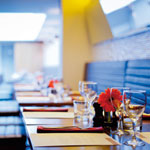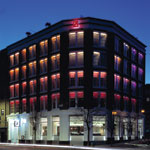Has water lost its bottle?
As customers' environmental concerns combine with cost cutting, Emily Manson asks whether the glory days of bottled water are officially over
Those who originally scoffed at yuppies for buying bottled water have been proved wrong. The industry is currently worth an estimated £1.44b in the UK alone. But there's no denying the market has been rocked by the public's concerns over the environment and sustainable living, not to mention the recession. These factors have reached a critical point where the bottled water market has now changed forever, especially in restaurants.
But it is hard for operators - who are already facing increased energy bills and recession-wary customers - to forgo the big profit margins achievable from bottled water.
Mark Linehan, managing director of the Sustainable Restaurant Association, says: "Tap water is clearly the most sustainable option but we do recognise that many restaurants rely upon bottled water for valuable income."
But it doesn't have to be all or nothing. There are many different ways to keep customers happy and be sustainable while at the same time retain financial margins.
Linehan suggests: "Installing an on-site filtration system can provide an excellent middle-way - a premium product that can deliver revenue while maintaining a minimal environmental impact."
Increasing numbers of operators, realising that the tide has changed for bottled water, are trying a new way to maintain revenue yet provide a cheaper alternative for the customer.
Paul Proctor, managing director of EcoPure Waters, which provides filtered water equipment, explains: "People were conditioned to feel it was the right thing to do to ask for expensive bottled water, now they resent paying lots of money and feel it's right to ask for tap water, but many don't actually want it. Providing an alternative that meets environmental and monetary demands is key."
There's no revenue or profit margin in tap water, so offering filtered water at a modest price can still enable operators to make as much or more of a margin as from offering bottled, advises Proctor. But there are other benefits too, as operators can save storage space, transportation costs and waste removal costs. These all generally offset the initial outlay of installing the filter equipment within around six months.
Proctor adds: "These practical benefits are also environmentally sound and we provide operators with a green passport, which details how much water is going through their system - and therefore how much waste has been prevented from going to landfill, and how many water miles have been saved - and they can use this information in any marketing they want. It's very useful and so far has saved around 11 million bottles going to landfill."
But if operators feel the need to serve bottled products, Linehan advises them to look out for companies that operate sustainably through their packaging, sourcing and funding.
"Reducing carbon by using recycled materials for both glass and plastic bottles, reducing packaging and engaging with charitable initiatives are examples of how some bottled water companies in the UK operate in a sustainable manner," he says.
Ethical and sustainable bottled water companies are now springing up. Belu was founded as a social enterprise in 2004 and it now has an estimated £2.9m turnover for this year. All profits from customers now go to WaterAid, while bottles are made from recycled materials and its six employees work remotely.
According to Karen Lynch, Belu's CEO, it's about customer choice. "It really depends on your market," she says. "Some cultures simply don't want to have tap water when eating out and there are also those with chemical intolerances so it's up to the business to take a holistic approach on how to best serve its customers."
But when bottled water is wanted, for taste, portability or natural flavours, then it's good for restaurants to offer a portfolio of solutions, she adds. "The bit I wish most is that they would draw the line when it comes to importing water from abroad," she says.
"The focus on provenance evolved when we couldn't rely on the quality of products from our home market. As with food, this has also changed with water. It's not necessary to import good water from Fiji or France."
Of course there is also good old fashioned tap water. Michael Green, founder of tapwater.org, warns the global bottled water business has created nothing short of an environmental disaster.
"There are too many people who are just completely ignoring the facts, it's so disturbing," he says.
Tap water in the UK, he argues, is the best in the world, tested 30,000 times a year, while bottled water is self-regulated so environmental claims do not have to be verified as stringently. He points out that mineral water has to be processed in the same way as tap, and labels the bottled water phenomenon as "a coup of fantastic marketing".
But he also warns operators and consumers not to believe everything they read about environmentally friendly products. Rather like local sourcing has become an over-used meaningless term, sustainable water is "classic greenwashing," he says.
"The plastics and water industry greenwash their products to make consumers feel comfortable about their purchases and a lot of it is simply bollocks," he adds.
Water The options
Tap Taste differs according to region but it is the most environmentally sound option.
Filtration system Installing a filter system allows operators to charge for providing a service while producing natural still and sparkling water. It saves on storage but there are initial set-up costs.
Bottled Look for sustainable bottled water and use local products rather than imported. Use ethical companies that use recycled materials, have recyclable containers and give profits to ethical projects.
Filtered Using filtered water in machines keeps them working at their most efficient and means equipment will last for longer.
Cover charge for unlimited still or sparkling water
Although they were and still are happy to serve it, Wrethman felt that tap water was a lower quality product than mineral water, so he started looking at other options.
"I saw Quo Vadis charged £2 a head for unlimited sparkling water and bread, like an old-fashioned cover charge. I didn't think we could charge that much, but I did the maths, charging £1 a head for unlimited still or sparkling water and bread, and compared it with the declining bottled water sales."
Even taking into account the cost of installing the equipment over a three-year period, this option made financial sense.
Wrethman says: "It was quite a risk, but people absolutely love it. We are still providing a service that we can charge for but it's also good value for the customer, if you think how much they used to spend on bottled water, it's also better for the environment. The carbon footprint of bottled water is quite shocking."
The restaurants now send around four fewer bags of rubbish each week to landfill and the switch gives Wrethman more fridge space to extend his white wine list. "It made total sense to switch," he says.
A couple of customers have challenged the policy, saying the restaurant is just charging for tap water, but Wrethman argues: "We're not and they get the bread as well so really anyone who challenges the legitimacy or fairness is mistaken. We're up front about what we charge. It's on our menus and we're proud of it."
Boreholes beneath the building
The well now not only provides grey water for use in facilities such as the toilets and the air-conditioning, but also drinking water, which is bottled for both the Zetter hotel and townhouse restaurants and rooms.
The hotel's co-founder Mark Sainsbury says: "The fact that we have our own well at the Zetter hotel & Bistrot Bruno Loubet means we can serve bottled water without any glass waste."
General manager Jason Catifeoglou adds: "There are other benefits too, which include the grey water system (loo flushing, air-con etc) and our energy loop, which helped us earn our Gold Award from Green Tourism. This is a significant accreditation, particularly as our corporate clients ask for our green credentials more and more."
Free filter water provides added value
All of Bite's contracts offer free filtered tap water to employees in the hospitality suites, staff restaurants and refreshment areas.
"Of course it's about economic justification, but we are happy to lose some of our earnings to work with clients to support their sustainable message. It provides added value to the contract and helps cement the relationship," he says.
At one of the company's contracts in Newbury, Bite has recently taken out bottled water from all the hospitality suites, saving the client £4,000 a year as well as the delivery costs of 120 bottles of water a week. Instead, a Vivreau filter system has been installed and Bite fills bottles on-site. At the same time, McFarlane took the chance to switch the staff restaurant from bottled water to One Water.
"It's sustainable and gives money back to fund African water pumps. Why would you not source something that helps other people less fortunate?" he says.
Other sites are now using jugged water and Brita water in meeting rooms, which has gone down well.
"The feedback has been great - people expect to get in a workplace what they can get on the high street," says McFarlane.












